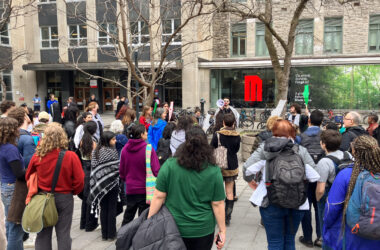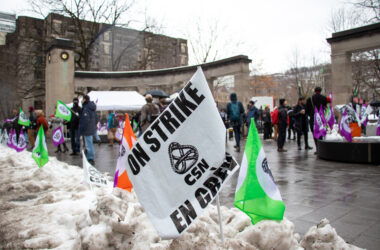In response to the Quebec Minister of Education Michelle Courchesne’s recent hint that tuition may increase in Quebec, a small group of McGill students gathered in protest at the Roddick Gates on February 18. Some carried signs reading, “Courchesne I can’t afford your lies” while others passed out flyers explaining that since the 2007 deregulation of tuition fees for Quebec and out-of-province students, tuition has increased by approximately $100 per year. Courchesne’s recent statements seemed to confirm these students’ fears that even larger tuition hikes are imminent in the near future.
In a February 11 La Presse article, Courchesne wrote, “I think that there is a consensus that is being established in Quebec. When I speak of consensus, I exclude students. But one sees that, more and more, the importance of increasing tuition fees is apparent.”
Courchesne, however, did not definitively announce that there would be tuition increases, only that “one will see what [Quebec Minister of Finance Raymond] Bachand will announce in his budget,” which will be made public in March.
According to Myriam Zaidi, Arts representative to the Students’ Society, “There was good momentum [behind the protest] because of the General Assembly that happened the week before where students voted against the self-funded tuition model and the increase of ancillary fees.”
“Does a consensus without the students’ advice really mean anything, in terms of consensus?” Arts and Science student John-Eric Hansson stated in response to Courchesne’s statements. “Even if the tuition increases didn’t affect me, I would still be here. I am in solidarity with all other students and that means that I also want to fight their tuition increases.”
McGill was one of many Quebec universities and CEGEPs to participate in the protest on the 18th against the potential tuition increases. SSMU Vice-President External Sebastian Ronderos-Morgan called the event a “symbolic action in solidarity.”
“The event was intended to encourage more awareness amongst the student body as to this announcement, primarily because there was very little coverage in the English papers,” he said.
Talks of tuition increases and a lack of student input has been a growing trend in Quebec. In particular, Ronderos-Morgan pointed to a “pre-advisory budget” Quebec economic forum last January.
“The business community and various other important people were invited by the government to discuss the budget, but nobody from the union sector or the student sector was invited. In fact, they were not even allowed inside,” he said. Because of these events, Ronderos-Morgan labeled Courchesne “out of touch with students.”
Regardless of tuition increases in the short-term, the protest helped to shed light on the broader issue of financing education in Quebec. Many students fear that the recent self-funded tuition model of McGill’s Master of Business Administration program sets a negative precedent for other Quebec universities. Referencing the higher tuition fees in both public and private American universities, JoÃl Pedneault, Arts representative to SSMU, explained, “People do not want to see American inequalities in Quebec.”
“A study commissioned by SSMU in 2007 proved that as tuition fees increase, the level of government contribution to university decreases, which is to say that [tuition increases] don’t necessarily, in the long run, improve the funding of the university,” added Ronderos-Morgan.
Approximately 52 per cent of McGill’s budget is subsidized by the government whereas less than 20 per cent comes from student tuition fees.
“At what point would it actually become more profitable for universities to have tuition hikes at the point where they would be earning more from tuition than from government subsidies, which would essentially be a private model?” asked Ronderos-Morgan.
“At any rate, I hope that we can strike a balance in Quebec between accessible education and not having an elite system,” Pedneault said. “Education should be a leveling factor in society, one that does not entrench inequalities and create a hyper-educated elite. I would hope that universities, like CEGEPs are supposed to create a cohesion within society,”
Ronderos-Morgan added that there will be “more plans of attack” over the course of March with regards to the allegations of tuition increases.








